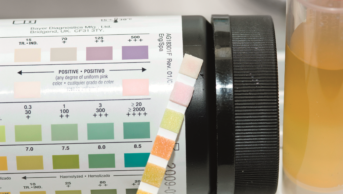
Shutterstock.com
Gepotidacin, a first-in-class triazaacenaphthylene antibiotic, has shown non-inferiority to nitrofurantoin in one trial, and superiority in a second trial, for the treatment of uncomplicated urinary tract infections (UTIs).
The randomised, phase III, non-inferiority trials, published by The Lancet on 8 February 2024, included 1,531 (EAGLE-2) and 1,605 (EAGLE-3) participants across 219 centres across the globe. The studies ran from 17 October 2019 to 30 November 2022 and 23 April 2020 to 1 December 2022, respectively.
Both studies included participants who were female at birth, non-pregnant, aged 12 years or older, weighing 40kg or more, with two or more symptoms of dysuria, frequency, urgency or lower abdominal pain, and with evidence of urinary nitrite, pyuria or both.
Participants were randomly assigned to receive either oral gepotidacin 1,500mg twice daily for five days or nitrofurantoin 100mg twice daily for five days — the current first-line treatment for uncomplicated UTI in the UK.
They were assessed for therapeutic success defined as combined clinical success (i.e. complete symptom resolution) and microbiological success (i.e. reduction of qualifying uropathogens to <10³ CFU/mL) without other systemic antimicrobial use at test-of-cure (i.e. day 10 to 13).
In EAGLE-2, 162 (50.6%) of 320 patients assigned gepotidacin and 135 (47.0%) of 287 patients assigned nitrofurantoin had therapeutic success (adjusted difference 4.3%, 95% confidence interval [CI]).
In EAGLE-3, 162 (58.5%) of 277 patients assigned gepotidacin and 115 (43.6%) of 264 patients assigned nitrofurantoin had therapeutic success (adjusted difference 14.6%, 95% CI).
The most common adverse event with gepotidacin was diarrhoea (observed in 111 (14%) of 766 patients in EAGLE-2 and in 147 (18%) of 804 patients in EAGLE-3). Both trials were stopped early for efficacy analysis.
Commenting on the study, Jacqueline Sneddon, chair of the Royal Pharmaceutical Society’s antimicrobial expert advisory group, said: “The addition of a new treatment option is welcome news for patients and clinical teams as resistant UTIs severely impact quality of life, and having an oral treatment available may avoid hospital admission.
“While uncomplicated UTI is a common condition that can usually be managed with currently available oral treatments, for a significant number of patients UTIs can become recurrent and difficult to manage.
“Repeated courses of antibiotics for UTI leads to infection with resistant organisms and may require admission to hospital for IV treatment,” she added.
Gepotidacin exerts its antibiotic effect by inhibiting the bacterial DNA replication of DNA gyrase and topoisomerase IV enzymes. Pooled data from trials showed that gepotidacin achieved higher therapeutic success than nitrofurantoin — 54.5% (322/591) versus 43.3% (241/556) against Escherichia coli, the most common uropathogen.
On 13 February 2024, a spokesperson for GSK, which manufactures gepotidacin, told The Pharmaceutical Journal that the company expected to file for regulatory approval in the United States in the second half of 2024, with a decision from the US Food and Drug Administration likely in 2025.
“If approved, it could be the first in a new class of oral antibiotics for uncomplicated UTI in over 20 years,” they said, adding that they were unable to provide any “background information on a UK timeline at this point.”
1 comment
You must be logged in to post a comment.



Has this become an option for UK yet?